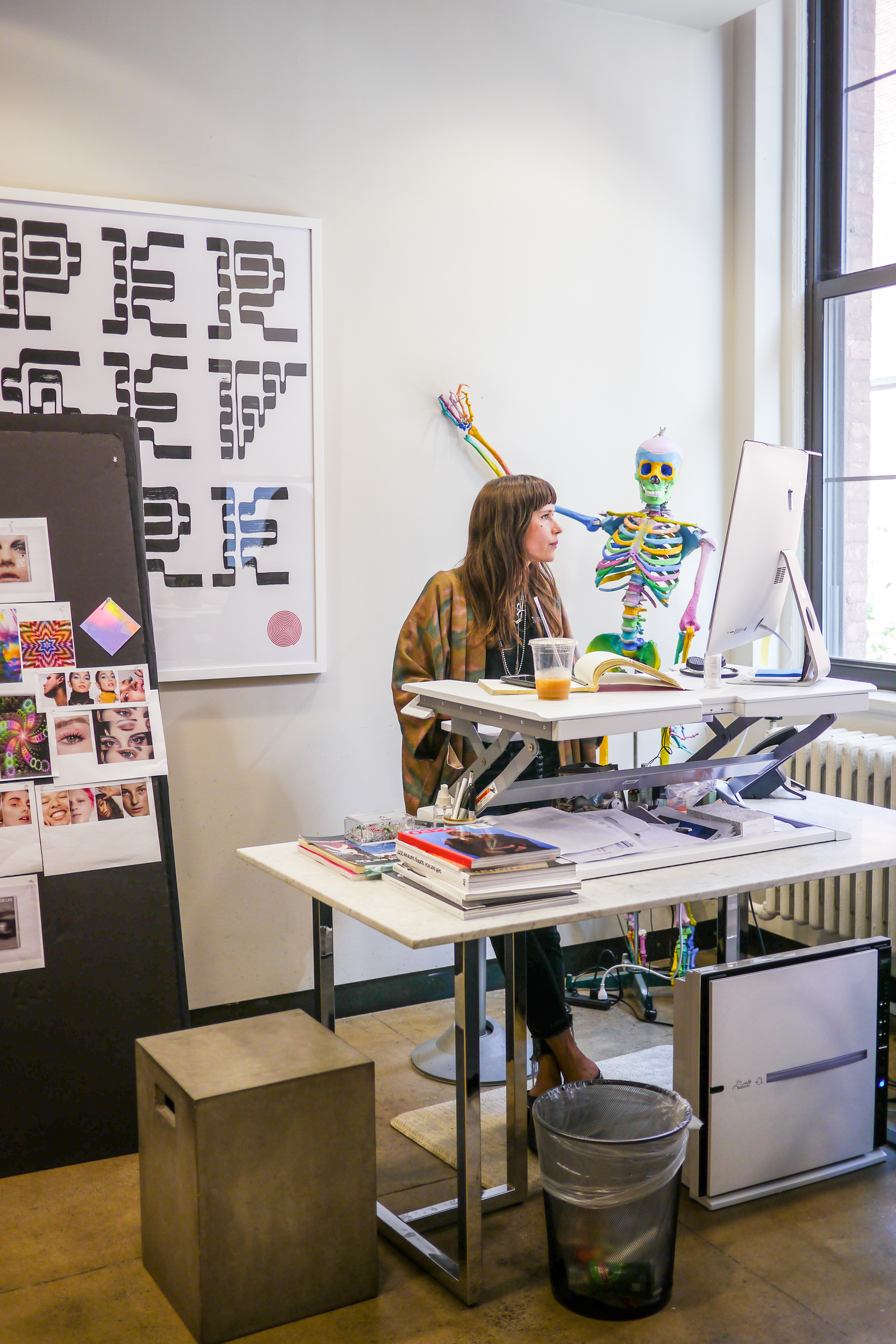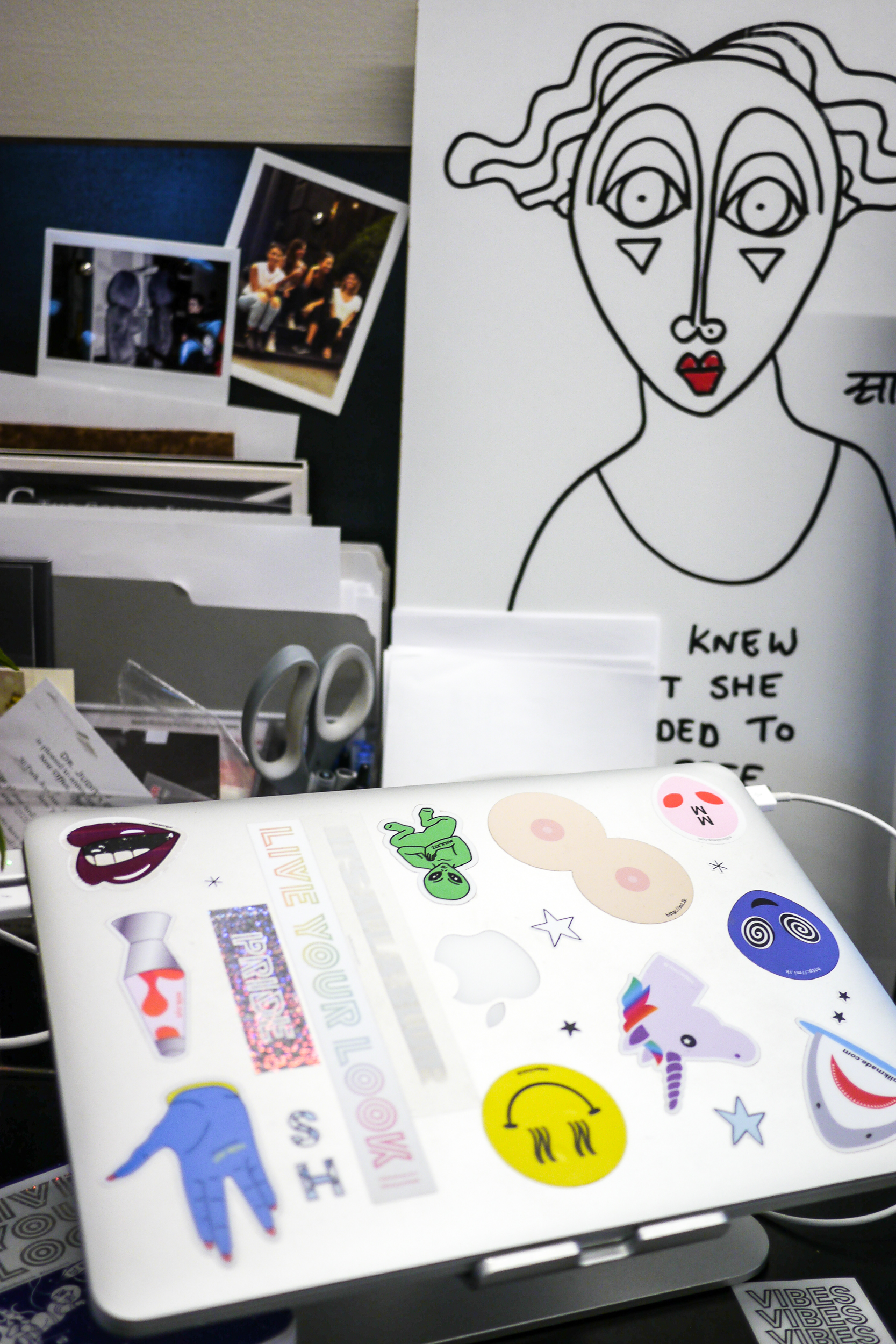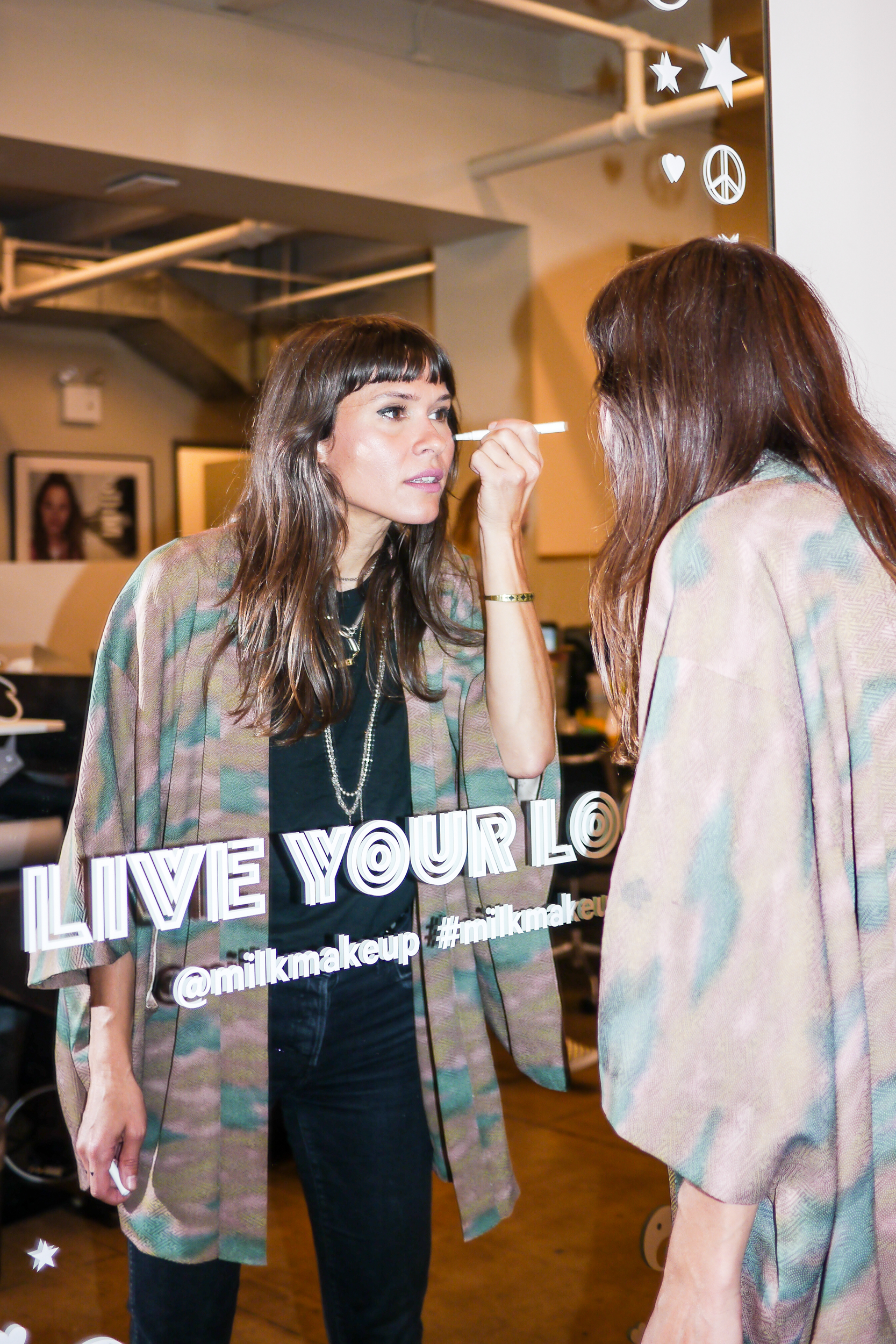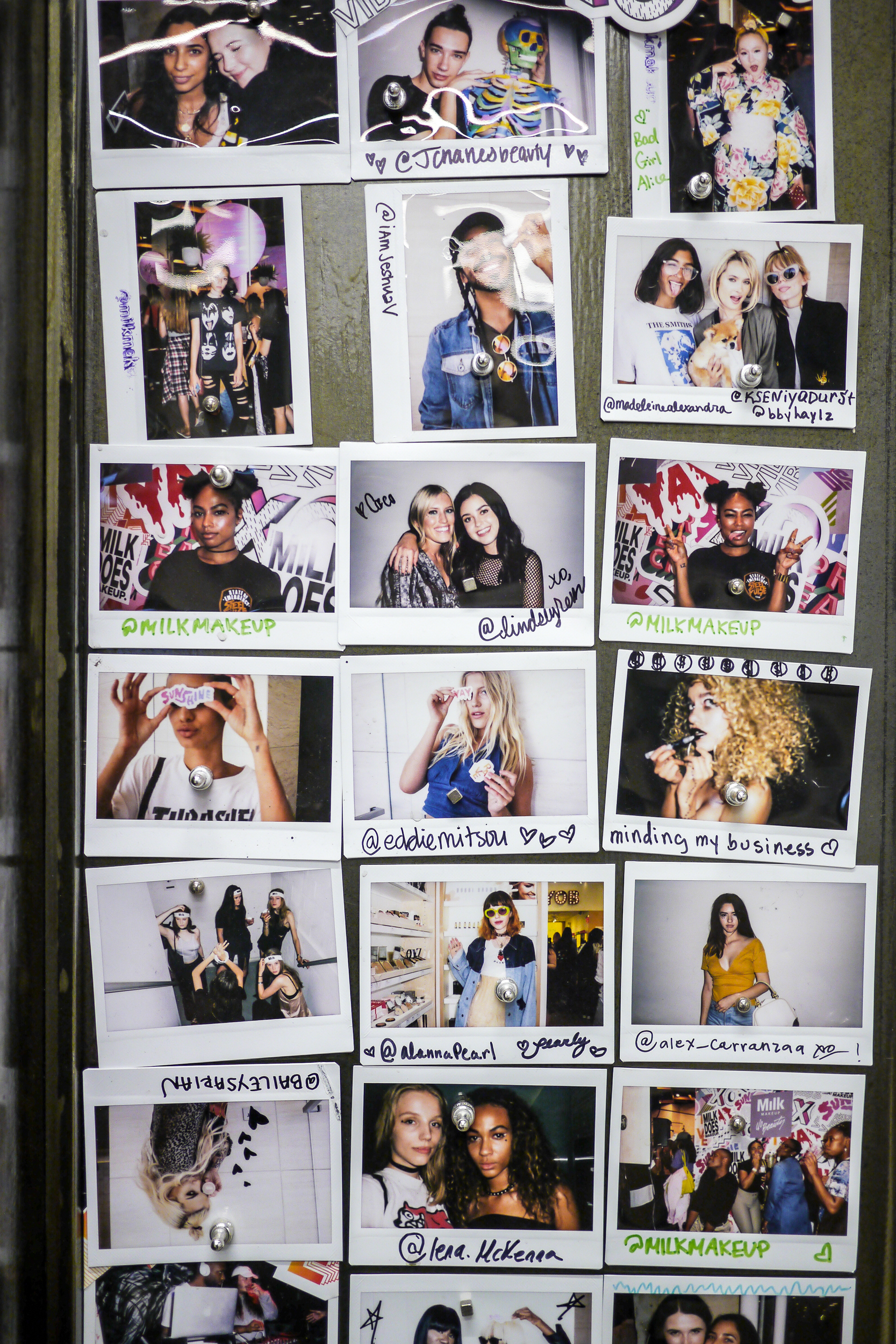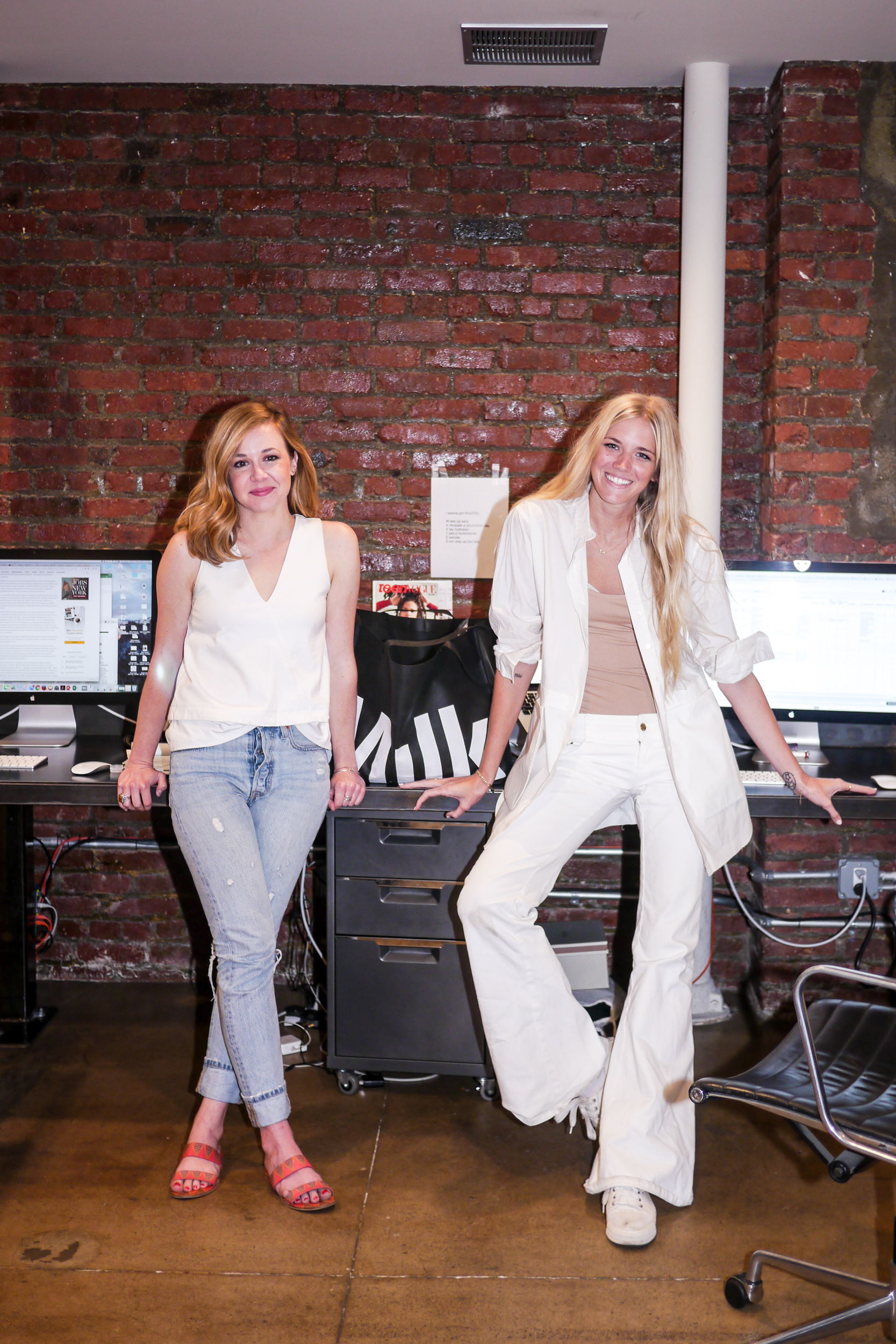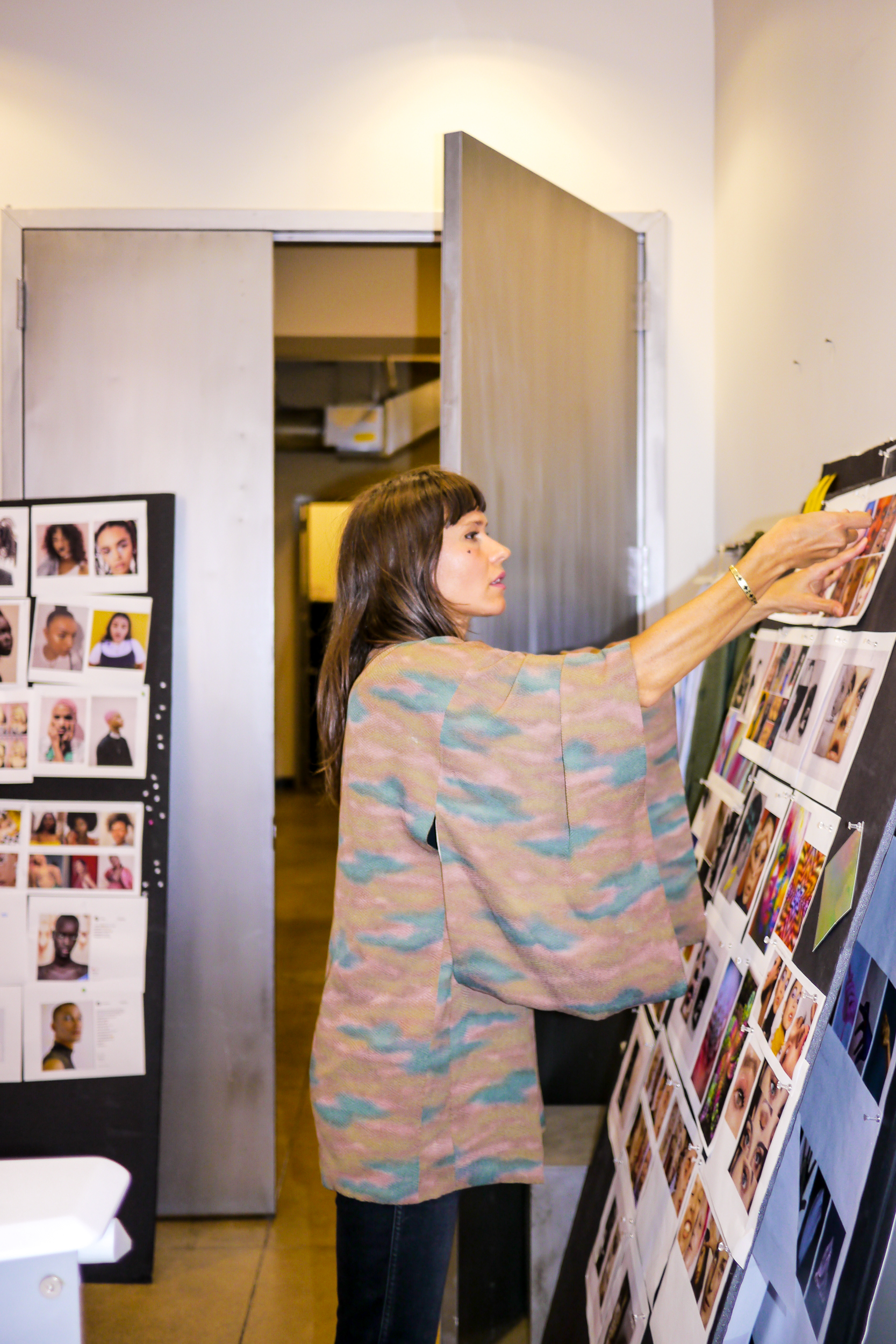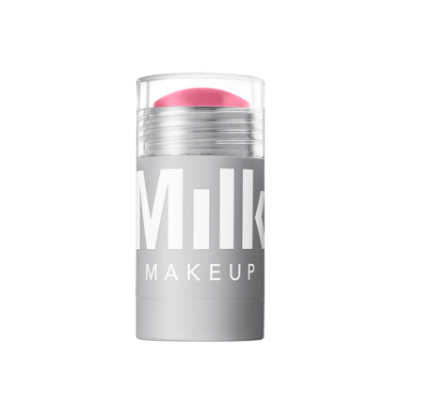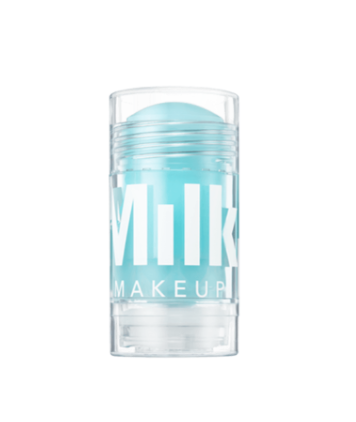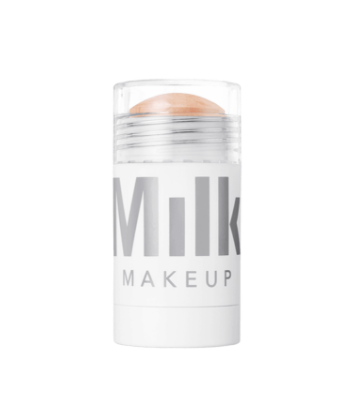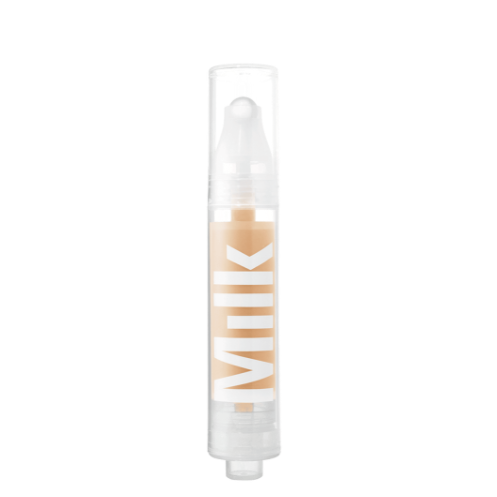“Georgie Greville, the co-founder and Creative Director of Milk Makeup, isn’t someone you’d necessarily expect to start a beauty company.”
For starters, she never worked in the beauty industry before launching the brand—she's spent most of her career directing film. And if you've seen any of Milk Makeup's (super badass) campaigns, that background makes a lot of sense. When it comes to beauty photography and marketing, Milk has taken pretty much every rulebook and—instead of throwing it out the window—cut it up into a million little pieces from which it then creates something totally new. It's been less than two years since the brand launched in January 2016, but Milk Makeup (which is part of the legendary Milk Group) quickly earned its reputation as the beauty industry's biggest rebel. From casting models that fall everywhere along the gender spectrum, to getting real about the bogus expectations of femininity that society has for women, they've taken an unlikely platform and used it to talk about subjects that the beauty and fashion industries try their hardest to avoid. On top of all that outspoken, creative energy that they're pumping into the world, they're also making a truly awesome product—makeup with innovative formulations that offer all the staying power you could want while actually being kind to your skin (and never at the cost of animals or the environment—Milk Makeup is cruelty-free, and most of their factories are solar-powered, FYI). We visited Georgie and her team at the Milk headquarters for a behind-the-scenes look at the makings of the cult-status beauty brand loved by passersby like Bianca Valle, Clara Flaherty, and many more.
Tell me a little bit about your background and what you were like growing up.
GEORGIE: I have a very non-traditional background, which has influenced pretty much everything in my life—I'm into being an outsider. My dad was a banker, and I grew up moving around constantly—I was born in Australia and then lived in Singapore, London, New York, and Boston. His company would rent us houses wherever we moved, and part of his job was entertaining clients. It was very weird to grow up that way—I have these sexy ex-pat parents who have PhDs in entertaining.
After moving to the states when I was a teen, I went to a really intense boarding school called Andover. It’s really rigorous and competitive...and I just wanted to be skateboarding, making art, or going to punk shows. I dated snowboarders and skaters. It was like an 80s movie, sneaking out and going to the public school prom—my high school love life was pretty epic (laughs). But I got exhausted from how competitive Andover was, and I really just wanted to write, study film, make art on my own terms, and snowboard, so I applied early to UVM. During the summertime, I would stay with family friends in New York while working for magazines, waitressing, bartending, PA’ing on films—stuff like that. And I knew that ultimately I needed to be in New York.
So how did you get your career in New York started after graduating? Because I know you didn’t start out in the beauty industry...
I just knew for some reason that I wanted to work at MTV—it still had a creative soul back then. So I tried all these different angles at getting a job there and ultimately got my foot in the door through a friend of a friend. MTV really became my de facto film school. I loved film but didn’t really know how to get into it, and by total luck I got into the promo department, where all the short form image content was being created. I knew I could write, so I started by writing copy for print ads and the like. I was very eager, so I was brought in to work on pitches, and I ended up writing a lot of concepts and scripts for these open pitches that MTV would open up to all the promo departments. And things like that just ended up working out, my scripts got chosen, and I got thrown into directing. So I always say I kind of wrote my way into directing. MTV being what it was back then, it was very loose in an amazing way in terms of letting young people just go for it. They really were just like, “Okay you wrote it, you direct it,” and so I was able to learn in this kind of crazy, high-stakes way with actual budgets. I ended up writing a directing a lot of co-branded content with beauty brands like L’Oreal as well as working on PSA’s and image campaigns.
Eventually, you struck out on your own, and that’s really when you joined the Milk family with your production company, Legs.
After six years at MTV, I started going out on my own, writing and directing my own fashion films and music videos. While I was at MTV, I would actually cast all my promo projects at House, Milk's in-house casting company, so I became friends with people at Milk through that (as well as from going out downtown). I became friends with [Milk Co-Founder Mazdack] Rassi, and I knew that there was this creative potential at Milk that I just couldn’t find anywhere else. I was always searching for that kind of place in New York—I’m really obsessed with 70s and 80s Warhol era, of like The Factory, Glenn O'Brien's TV Party and Max’s Kansas City, and the fact that at all these places, different facets of the creative community were able to come together and new, revolutionary things would happen. That’s the kind of feeling I got from being at Milk. That’s the kind of feeling I got from being at Milk.
So how did that turn into you becoming one of the founders and the creative director of Milk Makeup?
I co-founded Legs, Milk’s in-house creative production company, and directed advertising content and events for eight years until it got to the point where it felt like we were not getting anything out of the work any more. Similar to the trajectory of MTV, the jobs were becoming more and more corporate and safe. Meanwhile, Milk was building its creative community with amazing collaborations, events and MADE fashion week. I was in a lot of meetings with Rassi, and there was always talk about getting into products and makeup, but nobody had ever really given it a point of view. So I just sat down one day and really thought about what my peers and I would want in a makeup company, what would be personal to me, and what it is about Milk that is its actual magic. And that’s when I tapped into the reason why I gravitated here, which is that creative spirit, and the idea that you can get in the elevator and there’s this potential to meet someone inspiring and make something. It’s also so much more than just a photo studio—it’s a creative institution. And the fact that it’s inclusive is huge; as long as you have the self-confidence that you need to walk through the front door, you can hang here, which isn’t something you can say about most places in the fashion and art worlds. Dianna [Ruth], Zanna [Roberts Rassi] and I workshopped the concept for two years before we were ready to launch.
What did that first pitch look like?
It was all based on a downtown, savvy New Yorker’s ideals: so the best ingredients, as natural as possible, but giving you staying power. I was wearing a lot of natural beauty brands at the time, but also dabbling in the ones with more traditional formulations, because I needed that staying power. I wanted to get that Holy Grail of great ingredients, non-toxic, vegan, cruelty-free...but also innovative and truly modern, in the packaging but also in the formulation. We wanted to create a feminist line of makeup that spoke to makeup-wearers in a way they actually wanted to be spoken to—as multi-faceted, fun, intelligent people.
And especially when you’re talking about having the essence of a very creative company that’s all about self-expression, you want a line of products that really speaks to that.
Yes! They have to be creative tools. The packaging intentionally mimics art supplies. It has a very utilitarian, genderless look, almost a little Scandinavian. Luckily, Milk already had the branding going on as far as colors and the logo. So we had to figure out how to create the soul and pulse of the company through all the images and words and branding and tagline. It’s all coming from such a real place, because in a weird way, I am a product of Milk. I was attracted to Milk because of its spirit and energy, and I’ve intuited that into the brand.
“I always knew Milk Makeup needed to represent a cross-section of who would actually be at Milk, which is a really diverse and creative group of people. It’s also about including people that are creative on the inside, but may not show it yet—anybody that has that spirit, which is basically everybody.”
That tagline you’re talking about—Live Your Look—is really strong and has kind of blown up. Tell me about how you came up with it and what it means. How does it represent what Milk is all about?
The first tagline I wrote for the company actually spoke more about the products. It was “High Concept, Low-Maintenance” and was about these thoughtful, fun, modern products that are made to streamline your lifestyle to make things easier in your day-to-day life, but I realized quickly that that didn’t relate to everybody. Over the last year, we realized how broad our audience really is—our demographic is 13-65. I’ve had so many people reach out to me personally to say that they never even considered makeup before our line launched. The more and more I lived the brand and realized who was attracted to it, who it was reaching, I was like, “wow,” because it really is a wild, infinite spectrum of people that we’re talking to.
“Live Your Look” came about as something I just said when I was trying to articulate the idea of making choices that represent you as a person and having that dictate where your life goes in a meeting with Rassi and the team. The main connecting thread between everyone who uses Milk Makeup is this creative spirit, and living with that intention. The #LiveYourLook hashtag search on Instagram is actually the thing I’ve most proud of, because it’s so inclusive and such a crazy rainbow, or spectrum, of people. I also think that there’s just something very nuanced about how you live with makeup in terms of connecting to your power and harnessing your individuality. I feel like “Live Your Look” is beyond trend.
There’s that really important emphasis on the fact that you’re living your look, as opposed to the look. That spectrum of individuality is something you try to keep tapping into with your DNA projects. Could you talk about those?
It started with Blur The Lines, which was about gender fluidity, and we just did a Shades of Femininity project. It all comes out of an organic place where these are the people that we’ve cast in campaigns and that I’ve gotten to talk to and learn from. I love creating a new way to talk about issues with pop language and film techniques, as long as you have very deep intention going into what you’re communicating. As a brand, if you don’t have a point of view, then you’re going to have trouble connecting and creating a following.
You’ve talked about wanting to make a truly modern product—how do you do that? How do you figure out where to source the ingredients and materials, and how to come up with the formulas that achieve the results you’re after?
We got introduced to Dianna, who’s been in the game for 20 years. She went to FIT for beauty development. She knew every manufacturer, and how to cherry pick from each. Both the formulas and the secondaries (which is the term for what makeup products are housed in) are built from scratch, so almost everything in the line is an uber customized super-product: custom ingredients and blends, a cap from here, recycled plastic from there. We get our ingredients from places that source above-and-beyond quality ingredients. There’s a couple of different labs that are on the cutting edge of bringing amazing skincare ingredients into makeup.
It sounds like all your employees are just really badass and bring so much to the table. How do you find great people to work with?
It’s grit, man. It’s an organic thing. Our creative team has gone through many different iterations, but I am so happy with what we have built. Everyone at Milk Makeup wears multiple hats without question. There is a pervading positive, hardworking, scrappy spirit in our office. One big advantage was the fact that Dianna basically brought in her whole product development team, and she’s been working with them for over 10 years. That was a huge factor in terms of maximum efficiency, where you have everything down and there’s already trust there.
So would you say that product development is the most valuable asset to have in starting a company like this?
Oh yeah, and the fact that Dianna and I shared the same vision for this holy grail of modern beauty products was huge. She knew exactly how to make the products that a savvy downtown New York, jaded ass girl would want—someone who really reads ingredients, and really pays attention to how a formula feels and wears all day. She’s really done everything you can do in beauty, but she had never made something that was personal to her. I am so proud of the fact that she has replaced all the products in her makeup bag with ours.
Obviously you love and believe in all the products in the line, but do you have some personal favorites? Maybe things that you use literally every day, or products that you really are proud of and feel have really taken that idea of making a truly modern product to the next level?
Absolutely—my favorite products are the ones that are part of my everyday 5-minute routine. I’m really proud of the sticks, in general, but the Cooling Water, Lip + Cheek, and the Highlighter are my main sticks that I use. And then I use the Sunshine Skin Tint, which I find really amazing. You have to really use it to believe it, but it’s basically like this skin-nourishing skin tint that’s translucent and improves your skin throughout the day. As soon as I started using it, people were like, “What is up with your skin!? Tell me everything you are using!” It’s this amazing, serum-like skin tint that really does make you look more radiant throughout the day.
Which is like, unheard of for foundation. And that’s such a struggle I think of people who really care about ingredients in skincare: you put all these amazing ingredients on through your moisturizers, your serums, etc, but then you’re like okay, crap, what do I use as a foundation? Because even some of the natural brands still have things like silicones in them.
And that is literally where we come in. Dianna has been in the beauty world long enough to know how to truly modernize formulations and make them better for us. And you look at the formulations that are out there and have to ask, “why have they made this with silicone for so long?” It makes you wonder who’s making this stuff. I think what’s so interesting about right now is that everything is transparent—you can’t put out a bad product and just slap a designer label on it anymore. People are gonna know—they’re going to touch it and feel it and research it. Before, people only got a one-sided view of something, whereas now everything is on a turntable and you see every single aspect of a company: its soul and its values and its people, and I’m really proud of what we actually are holistically.
Any exciting projects or collaborations that you’re currently working on?
The thing that is so special about Milk is that the craziest combinations of things happen here that truly would never happen anywhere else. We have a couple of collaborations in the works that are totally unexpected and will make your head explode. A friend of mine who is an artist, Leikeli47, actually made a song for us, so we did a video for that which just came out. I want to develop a platform for emerging directors, and make that way more inclusive, showing different formats and styles of beauty content.
Final question is a big one: What kind of advice would you offer entrepreneurs?
I would say that it’s not enough to feel like you’re fulfilling a need—I think that you need to have a deep connection to why you want to do something. If you don’t have that, the staying power is gonna be tough, so when you’re developing your idea, you have to see how it hits with your own personal values. I’m amazed at how everything comes back to intention: what is your intention? What do you want to do? I lived my whole life wanting to feel more connected to creativity—I was searching for it, I always wanted my friends to be weirder. That’s why I moved to New York, and why I became friends with people in the art and fashion worlds. And I think that at the heart of Milk Makeup, there’s this wanting to feel included and wanting to feel creative, and that’s at the heart of who I am too. But at the same time, I think it hits a universal chord, that everybody kind of feels like that. So it comes back to figuring out how your personal values can connect to universal values. Where does that connection lie? And if your idea is something that connects those two things, then you’re onto something. But you always have to go deep.
—
SHOP GEORGIE'S FAVES
You can shop Milk Makeup's full line on their website and at Sephora locations nationwide. Follow @milkmakeup on Instagram for daily inspiration to #LiveYourLook.
Words by Kate Palisay



